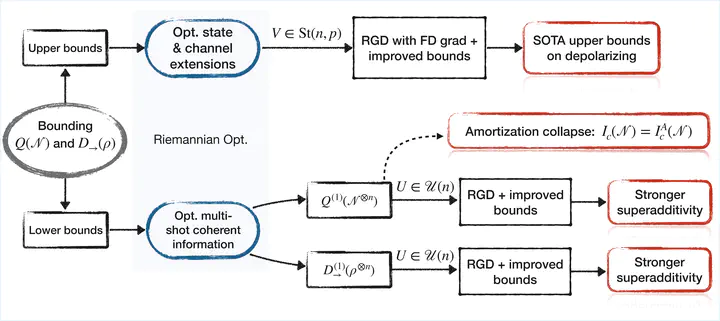 Overview of geometric optimization methods.
Overview of geometric optimization methods.Abstract
Determining the ultimate limits of quantum communication, such as the quantum capacity of a channel and the distillable entanglement of a shared state, remains a central challenge in quantum information theory, primarily due to the phenomenon of superadditivity. This work develops Riemannian optimization methods to establish significantly tighter, computable two-sided bounds on these fundamental quantities.
For upper bounds, our method systematically searches for state and channel extensions that minimize known information-theoretic bounds. We achieve this by parameterizing the space of all possible extensions as a Stiefel manifold, enabling a universal search that overcomes the limitations of ad-hoc constructions. Combined with an improved upper bound on the one-way distillable entanglement based on a refined continuity bound on quantum conditional entropy, our approach yields new state-of-the-art upper bounds on the quantum capacity of the qubit depolarizing channel for large values of the depolarizing parameter, strictly improving the previously best-known bounds.
For lower bounds, we introduce Riemannian optimization methods to compute multi-shot coherent information. We establish lower bounds on the one-way distillable entanglement by parameterizing quantum instruments on the unitary manifold, and on the quantum capacity by parameterizing code states with a product of unitary manifolds. Numerical results for noisy entangled states and different channels demonstrate that our methods successfully unlock superadditive gains, improving previous results. Together, these findings establish Riemannian optimization as a principled and powerful tool for navigating the complex landscape of quantum communication limits. Furthermore, we prove that amortization does not enhance the channel coherent information, thereby closing a potential avenue for improving capacity lower bounds in general. This result can be of independent interest.